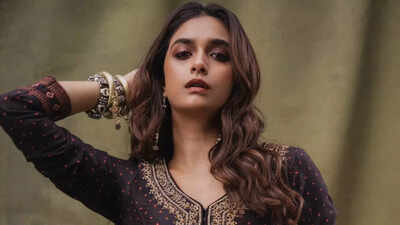The debate over work hours in the Indian film industry has resurfaced, with Mahanati actor Keerthy Suresh offering a detailed and candid perspective. As she gears up for the release of her upcoming film Revolver Rita, Suresh addressed the ongoing demand for an eight-hour workday — an issue that has divided actors, technicians and industry bodies across various regional cinemas.
Keerthy explains what a workday actually looks like
Speaking at the Telugu press conference of Revolver Rita, Suresh underlined that the idea of a “fixed shift” rarely reflects the full reality of an actor’s routine. She revealed that her schedules have spanned everything from nine-hour to 17-hour workdays.“Actually, I do all kinds of shifts: 9 to 6, 9 to 9 and 9 to 2. When I started off, while shooting for Mahanati, I shot for five other films (simultaneously). I’ve also done shoots where it is only from 9 to 6,” she said.
But she stressed that even a 9-to-6 shift is far more demanding than it appears on paper.“For me personally, I will work both ways, but let me tell you the general scenario… When you say 9 to 6, at 9 we have to be ready with makeup. That means we have to be on sets at 7.30, which means we have to leave by 6.30, for which we have to wake up at 5.30 in the morning.”
‘We hardly get six hours of sleep’
Suresh offered a minute-by-minute breakdown of how a day unfolds for most actors — revealing that even seemingly “reasonable” shifts still leave little time for rest. “After packing up at around 6 or 6.30, you change and leave the sets by 7. By the time you reach your home or hotel, it’ll be 8… By the time you come back it’s 10 o’clock… it’s 11. Now, what time do I have to wake up in the morning? At 5.30… we hardly get six hours of sleep, even when it’s a 9 to 6 work shift.”She noted that the situation becomes significantly worse during extended schedules, “So imagine when it’s 9 to 9 — you might get only five hours’ sleep or even less. Now imagine the technicians who come before us and leave after. That will take much more time.”Her comment highlights the persistent hierarchy of labour in cinema, where assistant directors, light men and junior technicians often face the harshest conditions.
Keerthy compares Tamil, Telugu, Malayalam and Hindi workflows
Keerthy Suresh also analysed how work cultures vary across Indian film industries.“It differs between industries. In Tamil and Telugu, there is a standard 9 to 6 shift… But in Malayalam and Hindi, it is 12 hours.”She added that Malayalam cinema, while known for its discipline and quality output, often leaves crew members with dangerously low rest time.“In Malayalam, they don’t have breaks at all; they work on a continuous schedule… they just sleep three to four hours, and in Kerala, I think the light men only sleep for two hours. So sleep is a big problem.”Her emphasis on sleep as a “basic necessity” aligns with the larger push for healthier, regulated working conditions across industries.
The case for eight-hour shifts
Suresh reiterated that the demand for an eight-hour day is not about actors seeking comfort but about creating a safer and more sustainable ecosystem for the entire crew.“The way we say food is important and working out is important. Similarly, sleep is also very important… generally there is a reason why they say a human should work for eight hours a day.”Her comments mirror the growing national conversation — especially after recent discussions sparked by Deepika Padukone’s exit from Sandeep Reddy Vanga’s Spirit starring Prabhas and Nag Ashwin’s Kalki 2898 AD sequel — about how Indian cinema needs structured, humane and globally competitive work standards.
Revolver Rita gears up for release
Directed by JK Chandra, Revolver Rita stars Keerthy Suresh alongside Radikaa Sarathkumar, Redin Kingsley, Mime Gopi, Sendrayan and Super Subbarayan. The film marks Chandra’s return to direction after Naveena Saraswathi Sabatham (2013).Revolver Rita hits theatres on November 28 and has already drawn attention for reasons beyond its storyline. Go to Source


